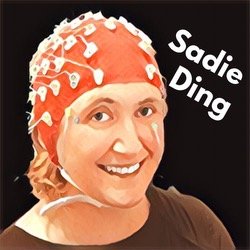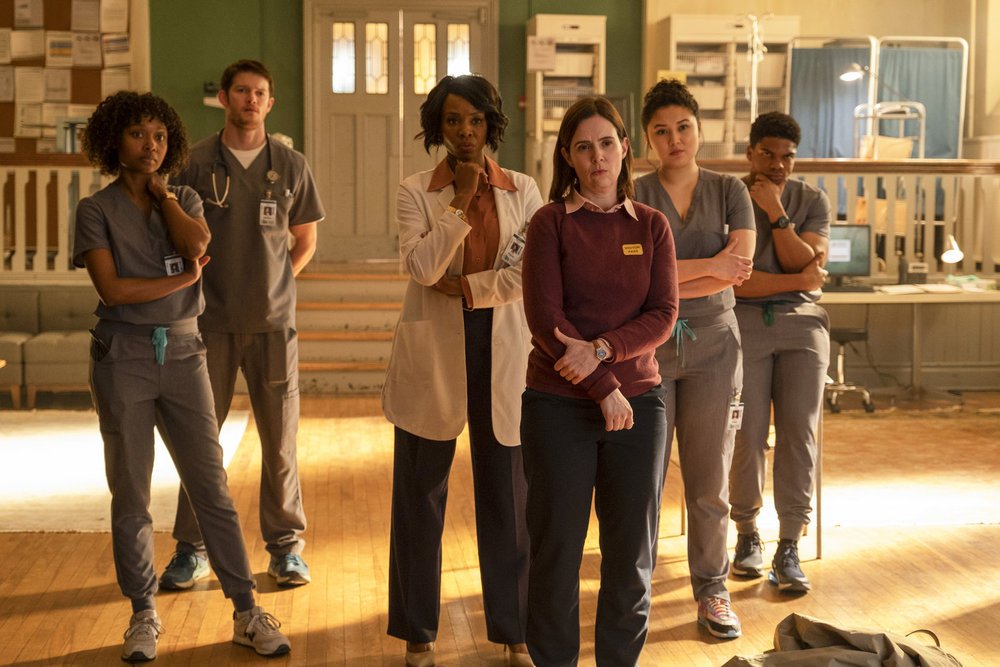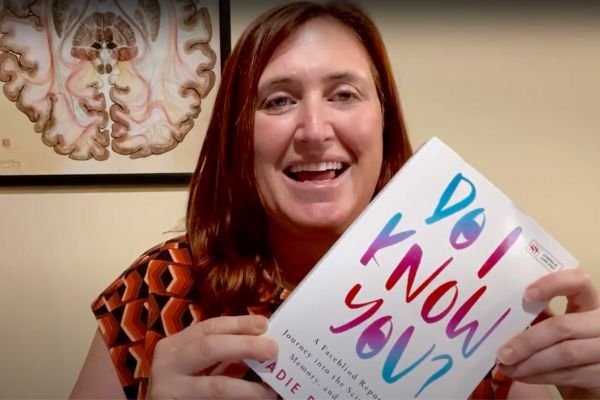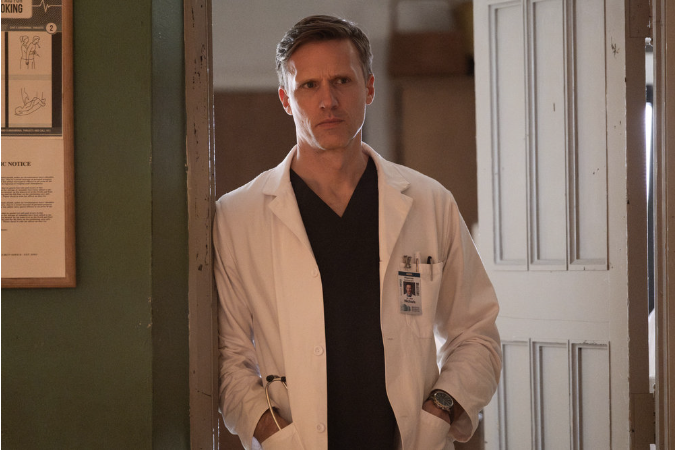Brilliant Minds Pilot Episode Recap
Welcome to Brilliant Minds on NBC, starring Zachary Quintos as Dr. Oliver Wolf, and co-starring his bushy, expressive eyebrows. It’s like House except the genius doctor isn’t an asshole on purpose; he snubs people by accident because he is faceblind.
But we don’t know this yet. Episode 1 opens on a scene of an elderly Black man staring vacantly into space while his nurse offers him water. Hiding behind the door is Dr. Wolf, who urges the elderly man, Harold, to put on a tux.
We see Dr. Wolf wheeling the guy out of the hospital, and two nurses sort of try to stop him. As they call security, one of the nurses wonders, “Why does he call me Marcy?” The other says, “I’m Marcy too. People say he can’t recognize faces, I just think he’s just a dick.”
Wolf and Harold walk into a wedding reception, and they are stopped by a mixed-race, mixed-age couple. Dr. Wolf puzzles over who these people are, and the director gives us a glimpse into his perspective by making their faces look blurry.
This is, by the way, the No. 1 trope for illustrating faceblindness, and it drives us face blind people nuts because it’s misleading. Most of us can see faces just fine, what we can’t do is remember them. The camera also does something interesting where it zooms from left eye to right eye to nose to mouth, to show how face blind people see faces as a collection of features instead of as a gestalt, a whole. Clever and research-based; love it!
Each of these interns has exactly one personality trait: From the left: Smarty, Emo, Druggie and Jock.
Wolf is puzzling over this mixed-race, mixed-age couple and I must note that this is not very realistic. It’s clear a second later that Wolf already knows this couple -- they are the parents hosting the wedding Wolf just crashed. Wolf would have been expecting to see them, and their height-, age-, and race-differences would have made them quite conspicuous.
Check out my book and audiobook on Amazon. It’s about my discovery at age 40 that I’m faceblind — and let me tell you, this solved a LOT of long-running life mysteries.
Now Wolf is sitting at the piano with Harold and the doctor plays a few notes on the keyboard -- oddly, they are not at all distinctive to me. They don’t even sound like the song that comes next. But they are distinctive to Harold -- and by, the way, the actor who played him absolutely left no crumbs. Harold’s face softens as he insults Wolf’s playing and then launches into a gorgeous rendition of, “God Only Knows,” by the Beach Boys. (I can’t quite figure out the thematic meaning behind this song choice, if you have any thoughts, share them in the comments! Maybe they picked it because it’s super short.) Wolf nods the trumpet player, and the rest of the band tastefully joins in.
After the song ends Harold stands up and the beautiful young bride rushes up to him and hugs him. “Grandpa?” “Sophie.” Not a dry eye in the house, including in my house. I feel emotionally manipulated, but it’s so well done that I’m ok with it.
I don’t feel like I need an explanation at this point, but the script writers do, so Wolf explains that music unlocks memories. Music is basically brain magic. Highly recommend Sacks’s book “Musicophilia,” to learn more.
Oh and kids -- if you want to deal with interesting case studies to figure out how the brain works, you might want to be a cognitive neuropsychologist (PhD) rather than a neurologist (MD). Fewer cadaver dissections, for one thing.
Cut to the Manhattan skyline and then we’re in a boardroom where Sacks gets, well, sacked. I mean Dr. Wolf gets sacked, because Harold’s kids are “threatening to sue.” My friends remarked that this seems silly, since obviously he did a great thing, but this actually did happen to the real Dr. Sacks, just over a longer time span.
André De Shields left no crumbs. First five minutes of this show made me happy cry.
“His world is darkening by the day and his days are numbered and while you would forget him? Let him rot? I choose to walk with him to find a path forward because nobody will. Yes it’s true Harold can’t live for the memories, he only has the moment and I’m going to help him and patients like him seize that moment no matter how fleeting that might be.”
I bolded that last bit just in case you didn’t notice that the scriptwriters want us to know Wolf’s raison d'être. “You want to change how your patients see the world,” a hospital admin says. “I want to change how the world sees my patients,” Wolf replies.
Antimetabole Count: 1
We see Sacks pressing iron, and his friend, a psychologist named Dr. Carole Pierce (Tamberla Perry) comes to check on him and offer him a job at Bronx General Hospital. She dangles a neurological mystery in front of his nose: A woman came in for a right temporal lobectomy to cure her life threatening epilepsy and now she’s acting oddly.
Quick note: a full right temporal lobectomy would be a wild thing to give someone in this day and age. That’s a huge chunk of brain and it would render you unable to retrieve old memories or make new ones, like the famous patient H.M. Today they ablate only a tiny bit of brain matter, if at all possible. (Side note: I have something akin to the developmental version of H.M.’s memory problem.)
If you had a left temporal lobectomy, by the way, you’d end up with visual object agnosia, the same problem as the titular character in Sack’s, “The Man Who Mistook His Wife for a Hat:” An inability to visually distinguish between different kinds of objects, also known as visual agnosia. In comparison, Sacks, Wolf and I have prosop (face) agnosia, the inability to distinguish between faces.
Carole says to Sacks that there’s been a dramatic shift in this woman’s behavior. “It’s a real anomaly, I’ve never seen anything like it.”
Wolf says he can’t work where Carole works and she knows why. Mysterious! Wolf takes a night swim in the Hudson to clear his mind -- something that Oliver Sacks actually did. (Well, almost. Sacks swam around City Island in Long Island Sound -- quite a bit cleaner.) (BTW: Sacks was also a bodybuilder and a motorcycle rider, but quite diffident, introverted and British. Wolf strikes me as quite strident and comfortable being the center of attention.)
We get a flashback of Wolf’s dad coaching him on swimming and then giving him the face-recognition tips of focusing on standout features. (Parents of faceblind kids: This is actually helpful coaching, but you’re also going to want to also tell them not to mention the standout features outloud, because it will offend people.)
That flashback merges into another one where Wolf’s dad, Noah Wolf (Gray Powell) stands at a kitchen and appears to have attempted suicide. Blood everywhere. (FYI, Oliver Sacks’ dad was a beloved country doctor who didn’t have any mental health issues as far as I know. Both Sacks’s parents and two of his brothers were doctors. In his memoir, he says he came to America, in part, because there were simply too many Dr. Sacks in England.)
The next scene is Wolf showing up to work at Bronx General. “As you can see, we are overcrowded and understaffed…” Carole says as she gives Wolf a tour. She said this earlier too, but as you shall see, this prophecy remains unfulfilled.
She also assigns him some interns, and Wolf balks. “I mean, this is so ‘House,’” he complains. Just kidding. He says he doesn’t like working with others. Carole tells him to come clean about his ‘condition.’ His homosexuality? Wolf jokes. No, Carole says, his prosopagnosia. (Sacks was also gay, by the way.)
Like Dr. Wolf, Dr. Sacks really did sneak a patient out of the hospital and give her a joy ride on his motorcycle! She was paralyzed and blind, and so she had to be strapped to him.
Wolf quips about doing drugs in med school, and Carol dresses him down. “Who do you think you are? Dr. House?” she says. Just kidding, she asks for him to be a good mentor for the poor interns who have dealt with a lot of upheaval.
Time to meet the interns! There’s hardworking square Ericka, (Ashleigh LaThrop), the comic relief gal Dana (Aury Krebs), the stressed-out guy Van (Alex MacNicoll), and the jock Jacob (Spence Moore II). They are in some kind of locker room, and we are all treated to a glimpse of sexy Dr. Wolf in a towel.
Awkward moment broken by a fracas in the hallway, where an upset redhead is being chased by nurses and orderlies. They are about to sedate her when Dr. Wolf steps in and asks what’s up. Our medical mystery, Hannah Peters (Kira Guloien), explains that when she went in for brain surgery, her kids were there. But when she came out, they had been replaced by … imposters!
So this is our medical mystery? The thing that Dr. Carole had never seen before? Because I have seen it! Specifically, I’ve seen it on Law and Order SVU, Scrubs, “New Amsterdam,” and “Chicago Med.” We are exactly 15 seconds into this woman’s case presentation, and anyone who paid attention in Intro Psych should be able to diagnose her. Dr. Wolf & Friends, however, are going to take quite a bit longer to figure it out.
If you don’t immediately know what’s wrong with this lady, Brilliant Minds must be your first medical show.
Next scene: We’re looking at MRIs of Hannah’s brain and the neurosurgeon Dr. Josh Nichols (Teddy Sears) shows up. Nichols says that he’s heard a lot about Wolf, and Wolf says he’s never heard of Nichols. Hmm… touch of the ‘tism maybe? Oliver Sacks, for his part, felt that he wasn’t on the spectrum, -- that his awkwardness with people was just a result of his prosopagnosia. I used to think this was true of me, too. However, I’m no longer so sure. Autism and faceblindness co-occur quite often, and I have recently noticed some autistic-like traits in myself, even though I definitely don’t qualify for the diagnoses.
Anyway, I’ve been on the lookout for a male love interest ever since Dr. Wolf said he was gay, and now I am hoping that it’s Dr. Nichols. A match made in heaven: they are both hot gym rats who are fascinated by brains. Of course, they are going to despise each other first.
Intern Erica helpfully shows up and gives a quick character sketch of all the other interns. They all pile into Dr. Wolf’s circa 1990s Volvo; Hannah, we will see later, drives some kind of old school boxy, wood-paneled station wagon(?) Anyway, Dr. Wolf pops one of his interns’ prescription pills (Benzo?) and they head to Hannah’s house.
Why are we going to her home? To observe her interacting with her kids, Wolf explains. Can’t we do this in the hospital? “Ask not what your country can do for you, ask what you can do for your country,” Wolf explains.
Oh wait, that was JFK. Wolf says: Ask not what disease the person has, ask what person the disease has.
Antimetabole Count: 2
Dr. Nichols (Teddy Sears) clearly messed up our redhead’s brain surgery.
A day has passed, maybe two, since we saw Hannah’s hospital freak out. But why let major neurosurgery get in the way of your relocation plans? The kids race radio-controlled cars around the half-opened moving boxes as Hannah says, “excuse the mess,” and explains that she moved into a new house the day after her surgery!
Dr. Wolf asks how she’s doing and she says fine, but he presses and she admits that she can’t connect with her kids because they are freaky body snatcher imposters. We are treated to a glimpse of the kids in Children of the Corn spooky lighting, which shows us how she “sees” them. Nifty.
Dr. Wolf has Hannah imagine her kids and love wells up in her chest. So she still loves her kids. That feeling is just not sparked when she looks at them.
Wolf is hanging out at home and his (land-line) phone rings. Next thing we know he’s on his motorcycle in the rain, and he pulls up to Hannah’s house where her children are being led away by child protective services. NYC’s CPS is ON IT, because apparently she left her kids out in the rain one time, and they immediately took her kids to a foster home. It’s not clear who thought to call her neurologist, or who has his home number. All I know is, I would like to get on Hannah’s health insurance plan.
The next day, Carole, the social worker, and Wolf debate whether Hannah is a fit mother. “Would you take away her children if she had a broken leg?” Wolf asks. “This is different,” the social worker says. Wolf argues that they are both injuries. It’s just that brain injuries require patience, time and “empathy beyond the ordinary.”
The kids ask what is on Dr. Wolf’s shirt, and he explains that it’s the periodic table, a “microcosm” representing all the matter in the universe. The kids politely pretend to know what ‘microcosm’ means.
Carole tells Wolf that the Chief Medical Officer wants to see him, and Wolf says he’s too busy.
Flashback to Wolf talking to his mom who says not to tell anyone about Wolf’s father’s mental breakdown. This old advice is also why Wolf is not telling people about his neurological condition.
Bronx General is the last hospital in the universe still using old-school CT scan illuminators. Everyone else switched to computers a decade ago.
“Childhood home,” Wolf says to himself. He uses the interns to research Hannah’s childhood home and then surprises her by driving her there. The interns squabble. “We’re in the business of understanding the human brain, especially when it’s strange, especially when it’s hopeless!” says intern Ericka. Another statement of purpose! Kinda heavy-handed if you ask me, but that’s a pilot episode for ya’.
On the drive to the mystery location, Hannah tells Dr. Wolf about taking her boys out to “the bluffs” and says she’s sad that she can’t take them there anymore. Once they get to the house, Hannah says she recognizes it but doesn’t feel anything. It looks like a movie set, she says.
Dear reader, do you know what Hannah has yet? It’s Capgras (pronounced Cap-grass or Cap-graw depending on how French you are) syndrome, which Dr. Wolf later explains poorly, in my opinion. Here’s a better explination. There’s also an interesting relationship between Capgras and (some cases of) prosopagnosia!
Dr. Wolf and the interns gather, and they play a video of Hannah’s kids. Without the visual information confusing her, she is able to connect their voices to feelings of love. Problem solved! Except … not. She has a seizure.
Hannah is reasonably distressed. She thought the brain surgery had gotten rid of the source of the epilepsy. Dr. Wolf explains that the surgery was a success, it’s just, the rest of her brain still “remembers” how to have a seizure. Friends, he is gaslighting this poor lady. Unless this seizure is just a freak occurrence, the surgery was a failure. I think the screenwriters were setting up some kind of conundrum whereby the focal point of this lady’s seizures just happens to be the pathway from her FFA (face recognition area) to her limbic system. So she has a tough choice: life threatening seizures, or never again feeling love at the sight of her children. But that plot option is not taken, so we just end up telling Hannah not to worry about it.
Dr. Nichols, the neurosurgeon, is upset. They have a sexy argument. Dr. Nichols says that Wolf’s off the case.
The kids show up to visit Hannah and she still doesn’t love them.
I just noticed that “Young Wolf” in the pilot (Simon Webster) is a different kid from Young Wolf in all the future episodes (Jaden Waldman). Wonder why they swapped kids?
Flashback to childhood, where Wolf’s mom says no one can help his father. Wolf goes swimming. Reflective music plays. Wolf checks in on Hannah and is dismayed to see that she’s no longer in the hospital; she checked herself out. Wolf hops onto his motorcycle, drives to “the bluffs” and stops Hannah from unaliving herself by putting himself between her car and the precipice.
“How did you know I’d be here?” Hannah quite reasonably asks.
Wolf gives her a pep talk.
New scene: Hannah is blindfolded and they bring in her kids. Is she going to love them? Yes! Everyone hugs. The social worker asks how Hannah is going to live her life blindfolded. Good question. Wolf explains that they will give her special glasses to distort her visual world a little so she can rebuild the face-recognition-emotion link. This is not anything I’ve heard of before, and I think it would create more problems than it solves. In real life, Hannah would be able to rebuild that pathway naturally, by taking advantage of the simultanious experience of hearing the kids, feeling love, and seeing them. Neurons that fire together wire together!
Hannah’s prescription also involves being honest about her condition, and so Dr. Wolf takes his own advice and comes out as faceblind to his interns. They appear to have never heard of prosopagnosia before. What are they even teaching in med schools these days?
Carole and Wolf have a chat. Carole says, “You know it’s a gift right, your faceblindness. It makes you look so much deeper. You see the stuff the rest of us miss.”
OK guys? I asked everyone in the Facebook faceblindness group (faceblindbook!) if they think that their disorder makes them “look deeper,” and 70% of respondents (so far) say that its total bunk. There’s no question that the real Dr. OIiver Sacks saw his patients as individuals and appreciated their common humanity no matter what else was going on -- but this has to be either independent of or in spite of his faceblindness. I, on the other hand, treat many people like non player characters, simply because everyone looks the same to me -- like thousands of penguins on the same Antarctic march. In fact, one good way to depict prosopagnosia would be to have the same actress play every brunette character, the same actor play every tall white guy, etc. (Orphan Black, by the was, was totally lost on me. Change someone’s hair and I will think they are a totally different person.)
Final scene: Dr. Wolf goes to meet the chief medical officer and … it’s his MOM!
Oliver Wolf Vs. Oliver Sacks Pt. 2: Would Dr. Sacks have done drugs?? At work???








